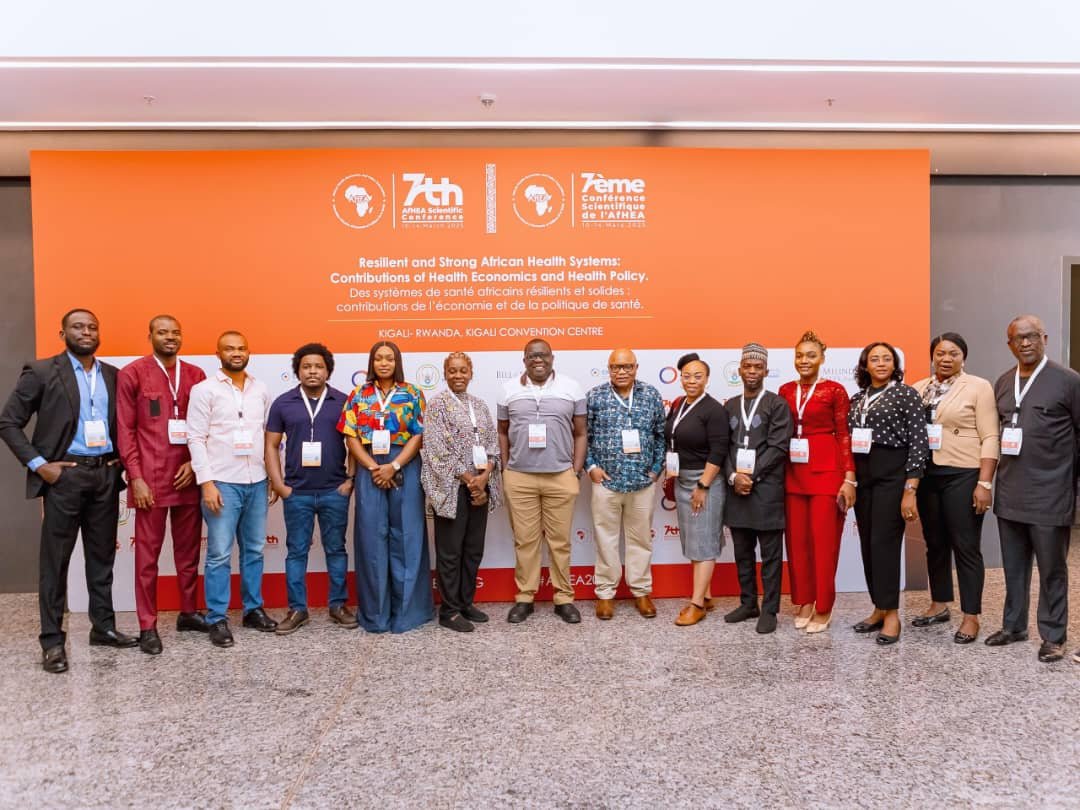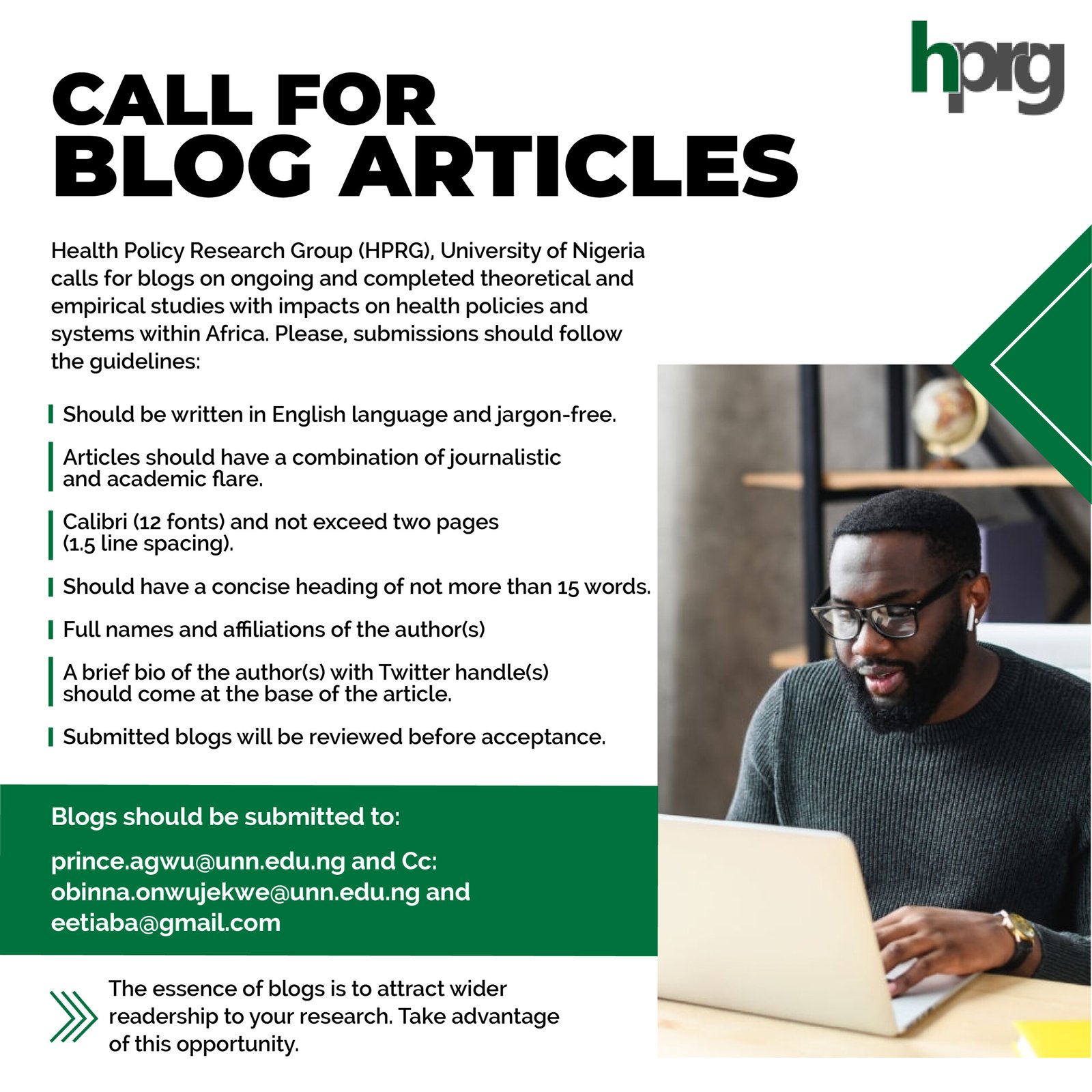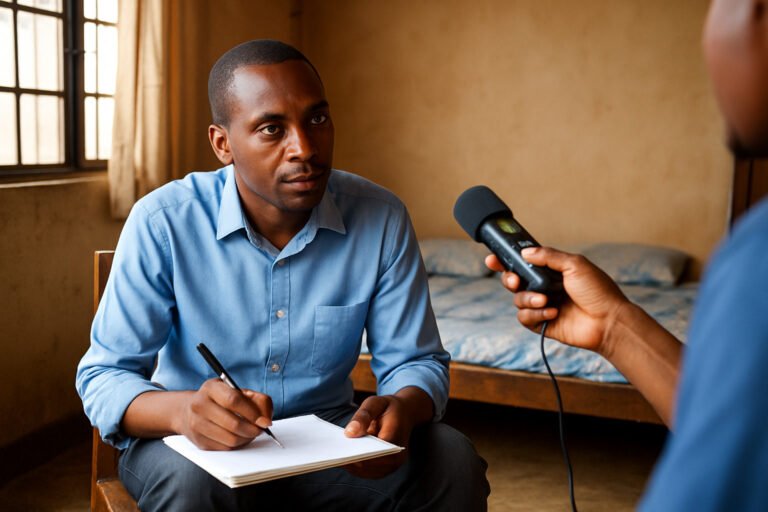The Health Policy Research Group (HPRG) at the University of Nigeria presents the first edition of its quarterly research spotlight with summaries of 14 studies it published between January and March 2025. The spotlighted research findings connect health policy pursuits within Nigeria, covering issues in health emergencies, accountability, health system administration, health evidence translation, sexual and reproductive health, and health financing.
Study 1: Assessing Root Causes and Solutions to Address Cross-Programmatic Inefficiencies in a Subnational Health System: A Case Study of Anambra State, Nigeria
Authors: Onwujekwe, O., Ezenwaka, U., Agwu, P., Nwokolo, C., Ukwuije, F., Earle, A., Gatome-Munyua, A., and Sparkes, S
Journal and year: Health Systems & Reform (2024)
Central Message: Several well-intentioned health programmes operate at the subnational level, but they are marred by inefficiencies caused by poor health system arrangement and inconsistencies between designed programmes and uniqueness of context. This study found misalignments between health programmes designed and approved at the national level and the health priorities of states; unnecessary duplications of supervisory mechanisms costing more money and causing distractions at the frontline; inconsistencies between health spending and the Chart of Accounts, which are barely updated, and weak accountability mechanisms.
Policy connection: Nigeria’s Sector Wide Approach (SWAp) under the Health Sector Renewal Investment Initiative (HSRII) can use the findings from this study to organise its subnational activities as it seeks devolution to states.
Download paper: https://www.tandfonline.com/doi/full/10.1080/23288604.2024.2441533#d1e598
Study 2: “What I’m Trying to Say Is That Some Nurses Are Good While Some Are Not Good”: Diverse Attitudes of Health Workers Providing Sexual and Reproductive Health Services to Young People in Nigeria.”
Authors: Odii, A., Agwu, P., Agu, I., Mbachu, C., Ezumah, N., and Onwujekwe, O
Journal and year: Sexuality and Social Policy (2025)
Central Message: Social characteristics like age, marital status, and economic background of young people seeking sexual and reproductive healthcare (SRH) services from health facilities could trigger negative or positive reactions from health workers. This study reports hostility of health workers towards young seekers of SRH services who were teens, single, of poor backgrounds, and perhaps in health facilities for abortion services.
Policy connection: The Health Sector Strategic Blueprint (HSSB) lists improving reproductive health as among its priorities. Including psychosocial awareness and management as a part of the ongoing training of primary health workers on integrated primary healthcare management should be a no-brainer. Additionally, the staff composition of primary health facilities to include psychosocial professionals like psychologists and social workers should be on the table.
Download paper: https://link.springer.com/article/10.1007/s13178-024-01076-2
Study 3: How can health systems better prepare for the next pandemic? A qualitative study of lessons learned from the COVID-19 response in Nigeria
Authors: Okeke, C., Uguru, N., Uzochukwu, B., and Onwujekwe, O
Journal and year: SSM-Health Systems (2025)
Central Message: Successful strategies that helped to contain COVID-19 in Nigeria should be institutionalised to avoid beginning afresh in the event of another health emergency. Steps to take can be mainstreaming successful guidelines and practices into curriculum contents and national health emergency response frameworks, consolidating partnerships with the private sector, and establishing systems for real-time data collection as well as laws that facilitate flexible but accountable procurement practices during health emergencies.
Policy connection: To add to ongoing health security efforts, a compilation of good practices and lessons throughout the COVID-19 pandemic, as documented in several studies, will make sense. This can be done across the health system building blocks.
Download paper: https://www.sciencedirect.com/science/article/pii/S2949856225000042
Study 4: A scoping review of the roles of stakeholders and coordination mechanisms for enhanced multi-sectoral and multi-level interventions in COVID-19 response in Nigeria
Authors: Ezenwaka, U., Mbachu, C., and Onwujekwe, O
Journal and year: Health Research Policy and Systems (2025)
Central Message: Taskforces and steering committees existed at the federal and state levels to combat COVID-19. While this is a good practice based on encouraging the decentralization of governance responses to health emergencies, efforts must be made to ensure coordination and integration. Progressive evidence on how best to work with multi-sectors in Nigeria has been poorly documented.
Policy connection: SWAp coordination office must consider reviewing and synthesizing existing health-related multisectoral frameworks that are specific to governance in health emergencies. This can lead towards a harmonized governance guideline for effective integration of multi-sectoral efforts during health emergencies across federal and state levels.
Download paper: https://link.springer.com/article/10.1186/s12961-024-01276-7
Study 5: Institutionalizing linkages between informal healthcare providers and the formal health system in Nigeria: what are the facilitating and constraining contextual influences?
Authors: Onwujekwe, O., Mbachu, C., Agyepong, I., and Elsey, H
Journal and year: Health Policy and Planning (2025)
Central Message: There are many Informal Health Providers (IHPs) like traditional healers, birth attendants, bone setters, and patent medicine vendors in urban slums providing last-mile care. However, effective integration of IHPs into the formal health system is yet to be achieved. This study reported that IHPs and formal health actors agreed about the feasibility of integration through establishing linkage channels like referrals, data reporting, and training IHPs to stay within a defined and enforced practice scope.
Policy connection: The Traditional, Complementary, and Alternative Medicines Department (TCAM) would need to partner with SWAp desk offices across the states to review why IHPs will (or will not) want to be a part of the formal health system, most of which this study has captured.
Download paper: https://academic.oup.com/heapol/advance-article/doi/10.1093/heapol/czaf009/8003620?login=false
Study 6: Evaluating knowledge gains from structured sexual and reproductive health education among in-school adolescents in Southeast Nigeria
Authors: Agu, C., Mbachu, C., Agu, I., Eigbiremolen, G., Iloabachie, U., Nwankpa, O., and Onwujekwe, O
Journal and year: Discover Public Health (2025)
Central Message: Adolescents in Nigerian schools are reporting increased knowledge of sexual and reproductive health (SRH). However, the extent of knowledge was found to be better among adolescents who attended schools with SRH interventions, females, and adolescents residing in urban settings.
Policy connection: Reviving school-based health services through the national school health policy in Nigeria and retooling SRH information to scale up knowledge among boys is crucial. Also, establishing seamless linkages between adolescent health-friendly centres and schools should be a priority.
Download paper: https://link.springer.com/article/10.1186/s12982-025-00412-0
Study 7: Enhancing the role of mass media in the translation of evidence from health policy and systems research in Nigeria
Authors: Agwu, P., Mbachu, C., and Onwujekwe, O
Journal and year: Health Research Policy and Systems (2025)
Central Message: Health policymakers appreciate and need evidence from health policy and system research (HPSR), but they are constrained by a range of concerns around accessing research articles in academic journals, language of researchers, and the capacity of academic journals to influence political decisions. Media’s political relevance, accessibility, and relatability can be useful in boosting accessibility to and use of research evidence by policymakers. HPSR experts will need to forge collaborations with the media to appeal more to policymakers.
Policy connection: Researchers would have to work closely with the media or use media strategies to seamlessly target policymakers. Policymakers should likewise cultivate a culture of embracing and utilizing research evidence for decision-making.
Download paper: https://link.springer.com/article/10.1186/s12961-024-01267-8
Study 8: Strenghtening health system resilience: lessons from Nigeria’s COVID-19 pandemic governance strategies
Authors: Mbachu, C., Etiaba, E., Onyedinma, C., Kreling, B., and Onwujekwe, O
Research Outlet and year: The African Health Observatory Platform on Health Systems and Policies (AHOP) – (2024/2025)
Central Message: Nigeria’s containment of COVID-19 had several positives, which, if institutionalised, will intensify the resilience of Nigeria’s health system. Multisectoral collaborations, dashboard technology for resource communication/accountability, decentralised and equipped laboratories, and well-organised and composed health emergency leadership are vital to preparing the country’s health system for effective response to disease outbreaks. But these will make more sense if consolidated in the health system.
Policy connection: As the Nigeria Centre for Disease Control and Prevention (NCDC) and partner ministries and agencies move to address the gaps identified during the response to COVID-19, they should be reminded of the existing wins and take concrete steps to institutionalise them into the country’s health security architecture.
Download paper: https://ahop.aho.afro.who.int/2025/01/20/new-ahop-policy-brief-on-nigerias-covid-19-pandemic-governance-strategies/
Study 9: Who Is Most Likely to Experience Corruption When Seeking Health Care in Nigerian Healthcare Facilities?
Authors: Agu, I., Nwokolo, C., Onwujekwe, O., McKee, M., Eleanor, H., Angell, B., and Balabanova, D
Journal and year: International Journal of Health Policy and Management (2025)
Central Message: Nigeria’s health sector ranks among the top 3 or 5 most corrupt sectors in the country as reported by several surveys. In this study, half of 1659 users of health facilities across northern and southern Nigeria reported corruption among health service providers. Corruption was reported to be pervasive, such that a higher level of education did not insulate health service users from being victims.
Policy connection: Ongoing collaboration between the health sector and anticorruption agencies must be guided by evidence to design bespoke anticorruption strategies for the health sector. Also, decentralization of the anticorruption units in the health sector is crucial. The operational guidelines of these units must thrive on context-specific evidence that considers varying demographic experiences of corruption.
Download paper: https://www.ijhpm.com/article_4713.html
Study 10: Multisectoral contributions to health security and formal policy availability at the community level in Nigeria
Authors: Etiaba, E., Agwu, P., Conteh, L., and Onwujekwe, O
Journal and year: Frontiers in Public Health (2025)
Central Message: Nigeria has agreed to implement the Health in All Policies (HiAP), which seeks to achieve health mainstreaming in the policies and priorities of other sectors. As obtainable globally, this study reveals several intersectoral interventions to improve community health. Unfortunately, they were largely ad-hoc, leaving sustainability in doubt. To get the best out of these interventions, there is an urgent need for organisation and policy frameworks to manage these intersectoral contributions and prevent duplication of efforts and wastage common in most LMICs.
Policy connection: Nigeria’s multisectoral action plan for non-communicable diseases can be replicated in other health activities. As SWAp pursues decentralisation, using the existing action plan to organise intersectoral contributions towards health activities at the community level can be a viable approach.
Download paper: https://www.frontiersin.org/journals/public-health/articles/10.3389/fpubh.2025.1505383/full
Study 11: Determinants of young people’s gender norm and attitudes related to rights and equity in Southeast Nigeria
Authors: Eze, I., Mbachu, C., Nwankpa, O., and Onwujekwe, O
Journal and year: Archives of Public Health(2025)
Central Message: Traditional gender norms are still prevalent among young people despite their usual open campaigns for gender equality. There are knock-on effects of these traditional gender norms on health decision-making.
Policy connection: Health promotion must continue to target men whose domestic authorities are still much acknowledged even among the younger generations.
Download paper: https://link.springer.com/article/10.1186/s13690-025-01550-2
Study 12: Willingness to pay for hepatitis B immunoglobulin among pregnant women in Enugu metropolis, South-East, Nigeria: a cross-sectional study
Authors: Enebe, J., Enebe, N., and Obinna E. Onwujekwe, O
Journal and year: BMC Pregnancy and Childbirth (2025)
Central Message: Hepatitis B immunoprophylaxis reduces the rate of mother-to-child Hepatitis B virus infection, but access to the vaccine remains a challenge. This study reveals that 86.2% of 379 pregnant women expressed willingness to pay for the vaccine. However, the average maximum cost the women agreed to pay for the vaccine was far below its market value.
Policy connection: Subsidizing the cost of Hepatitis B immunoprophylaxis among pregnant women could be a first step towards increasing financial access to this vaccine and is currently the most feasible option.
Download paper: https://bmcpregnancychildbirth.biomedcentral.com/articles/10.1186/s12884-025-07386-6
Study 13: Assessing informal healthcare providers’ knowledge of diagnosis and treatment of malaria and diarrhea: evidence from urban informal settlements in Southeast Nigeria
Authors: Arize, I., Ozughalu, J., Okechi, B., Mbachu, C., Onwujekwe, O., and Ebenso, B
Journal and year: Frontiers in Public Health (2025)
Central Message: As efforts continue to intensify towards integrating informal health providers (IHPs) into the formal health system, this study provides more justification for the usefulness of IHPs in reducing disease burden (e.g., malaria) at last-mile locations like urban slums. More than the average of 65% of IHPs in the study could identify the appropriate treatments for malaria and diarrhea. However, concerns about inappropriate diagnosis persisted due to poor educational levels and the absence of the right diagnostic equipment among the IHPs.
Policy connection: IHPs can play vital roles in increasing access to health services in last-mile and underserved areas. However, in pursuit of their integration into the formal health system and determining their practice scope, it is important to consider their possession and knowledge of the usage of diagnostic tools as well as their educational attainment.
Download paper: https://www.frontiersin.org/journals/public-health/articles/10.3389/fpubh.2025.1556996/full
Study 14: Who benefits from the donor-supported malaria programme in Enugu State, Nigeria? A benefit incidence analysis
Authors: Obikeze, E., Mao, W., Ezenwaka, U., Arize, I., Ogbuoji, O., and Onwujekwe, O
Journal and year: PLOS Global Public Health (2025)
Central Message: Nigeria ranks first in global malaria burden. Support for malaria treatment has been quite substantial, even though not enough to have substantially reduced the financial burden of the illness on Nigerian households. This study discovered high out-of-pocket payments for malaria preventive, diagnostic, and treatment services. The poorest households suffered the most. Free services like the distribution of bed nets were inequitable.
Policy connection: The rolling out of malaria vaccines should be progressively distributed, starting with the poorest households, to drastically reduce the incidence of catastrophic health spending due to malaria. Recent anticorruption campaigns in the health sector should extend to entrenching accountability and transparency in the distribution of antimalaria supplies and coordination of antimalaria programmes.
Download paper: https://journals.plos.org/globalpublichealth/article?id=10.1371/journal.pgph.0004286
Conclusion
Thanks so much for finding the time to read our work. The next edition promises to be as brilliant as this. Feel free to contact the team for further conversations on what we do and how you can access more of our published studies. HPRG has published hundreds of studies on health systems, health policy, public health, health economics, and health administration and management concerning Nigeria, Africa, and several low- and middle-income countries. We hope you visit our website often https://hprgunn.com/ and that you keep in touch with the team.
Click to download PDF version here
How to cite: Health Policy Research Group (2025). Quarterly research spotlight from the Health Policy Research Group (January – March 2025). https://hprgunn.com/quarterly-research-spotlight-from-the-health-policy-research-group-university-of-nigeria-covering-january-to-march-2025/

Best wishes from us!
Contacts: obinna.onwujekwe@unn.edu.ng and prince.agwu@unn.edu.ng
Follow us on LinkedIn: Health Policy Research Group UNN
X: HPRG_Nigeria





